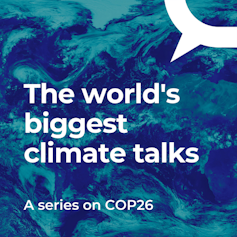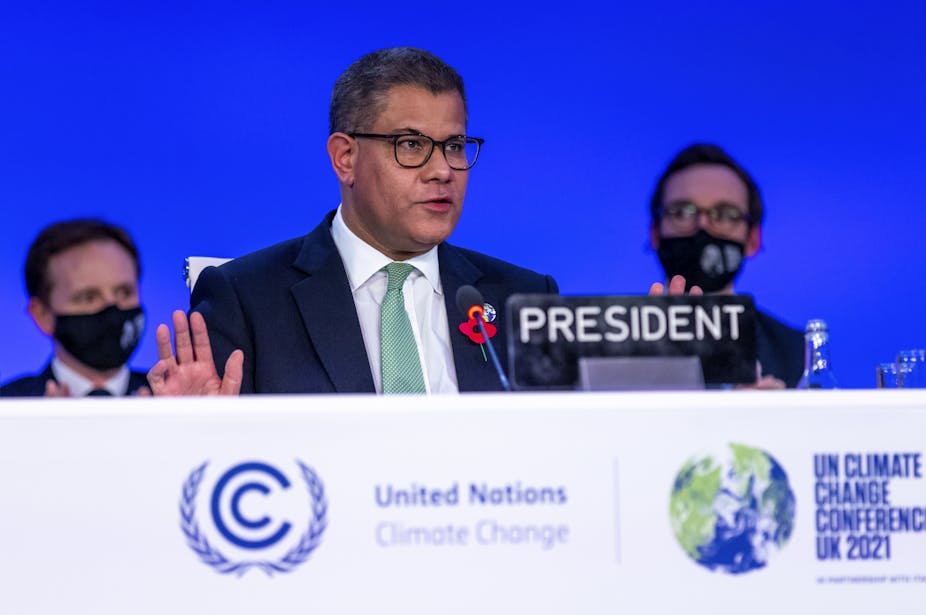What did the Glasgow COP26 climate change summit actually achieve? In this episode of The Conversation Weekly podcast, we speak to researchers from around the world for their views on the negotiations and what needs to happen now.
As he finally brought the gavel down on the Glasgow COP26 climate summit on November 13, Alok Sharma, a British minister and president of COP26, became emotional. “I apologise for the way this process has unfolded, and I am deeply sorry,” Sharma said, adding: “I also understand the deep disappointment.”
Headlines focused on a last-minute change to language around fossil fuels in the final Glasgow Climate Pact. A call on countries to “phase out” coal power was changed to “phase down of unabated coal power” – that’s coal power that doesn’t include the capture and storage of carbon dioxide emissions. The blame for the change was laid, some say unfairly, on India and China.
So what does the final agreement mean for different parts of the world? In this episode, we’re joined by Jack Marley, UK energy and environment editor for The Conversation, who was in Glasgow for COP26 and spoke to experts from around the world about what was going on.
Saleemul Huq, director of the International Centre for Climate and Development at the Independent University Bangladesh, tells us (at 3m00s) that despite some promising announcements in the first week, such as on cutting methane emissions and halting deforestation, “the climate is telling us, very vividly, that you’re not doing enough”.
In the closing stages of the summit, the US and China announced a bilateral deal to work together on cutting emissions. Richard Beardsworth, professor of international relations at the University of Leeds in England, explains the wider political significance of the move (at 18m45s). And Rachel Kyte, dean of the Fletcher School at Tufts University in the US (at7m40s), gives us a run through of what needs to happen now to make sure countries implement the pledges made in Glasgow.
Read more: COP26 left the world with a climate to-do list: Here are 5 things to watch for in 2022
Anna Malos, country lead for Australia at ClimateWorks, part of Monash University in Australia, says while there are always going to be big problems with what’s agreed at COP summits, what she really saw was a “big step up in momentum”. Malos explains (at 24m10s) what the final agreement means for Australia – a significant exporter of fossil fuels.
And we hear from Indonesian ocean and climate expert, Intan Suchi Nurhati, a senior scientist at the National Research and Innovation Agency in Indonesia, for her view of what was agreed in Glasgow. “With every COP, we have hopes and of course disappointments,” Nurhati says (at 36m10s). Those disappointments, she adds, were “not because the achievements are not great”, but because with so much scientific information available to the delegates, the results of their negotiations could better match the urgency of the situation.
To hear more about the issues at stake in global climate negotiations, check out Climate Fight: the world’s biggest negotiation, a series hosted by Jack Marley for The Conversation’s The Anthill podcast.
To end this episode, Stephen Khan, global executive editor for The Conversation, based in London, gives us some recommended reading.
This episode of The Conversation Weekly was produced by Mend Mariwany and Gemma Ware, with sound design by Eloise Stevens. Our theme music is by Neeta Sarl. You can find us on Twitter @TC_Audio, on Instagram at theconversationdotcom or via email. You can also sign up to The Conversation’s free daily email here.
Newsclips in this episode from France24 English, Al Jazeera English, SABC News, ABC News (Australia), Arirang News, and 10 News First.
You can listen to The Conversation Weekly via any of the apps listed above, download it directly via our RSS feed, or find out how else to listen here.

This story is part of The Conversation’s coverage on COP26, the Glasgow climate conference, by experts from around the world.
Amid a rising tide of climate news and stories, The Conversation is here to clear the air and make sure you get information you can trust. More.

